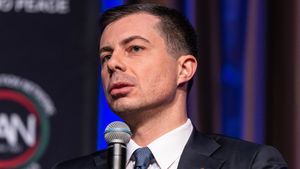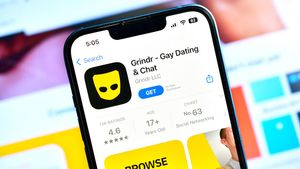Danny Roberts, known for his appearance on The Real World: New Orleans in 2000, emerged not just as a reality TV star but inadvertently as a symbol of activism. A gay man dating a military officer, he became a face against the discriminatory "Don't Ask, Don't Tell" policy. After leaving reality television behind, Danny now resides in New York City, working as a digital design recruiter and cherishing fatherhood to an adopted daughter, all while living with HIV. In a candid conversation with Plus, Danny opens up about his journey, the challenges of HIV treatment, battling stigma, and embracing a life without limits.
Reflecting on his journey from being thrust into accidental activism to intentional advocacy, Danny acknowledges the evolution of his role. "In those early days, I stumbled into ‘Don’t Ask, Don’t Tell’ without a clue," he recalls. "But now being HIV positive, I’m aware of the impact my story has on others, especially those who are newly diagnosed. It’s important for me and others to stay visible and share our experiences, because then others will feel comfortable to do the same."
 Courtesy Lulu Dropo
Courtesy Lulu Dropo
From his own experiences and listening to the stories of others, Danny is familiar with many of the issues and challenges facing those living with HIV.
Addressing the financial barriers to treatment, Danny highlights the grim reality faced by many. "The cost of healthcare is obscene," he remarks. "It’s not accessible to a large swath of the population, and with HIV, you don’t have time to waste navigating the healthcare system. It’s so important to get yourself healthy and undetectable as quickly as possible, which is just not realistic for many people."
Also, despite advancements in treatment, stigma remains a significant hurdle for people with HIV. "For half this country, HIV is still viewed as a death sentence to be moralized and shamed," Danny laments. "Even in our own community, there’s this lack of knowledge about what it means to be undetectable.”
 Courtesy Lulu Dropo
Courtesy Lulu Dropo
Being undetectable means that if someone has an undetectable viral load, they cannot sexually transmit HIV to others. “Unfortunately for many, being HIV positive is a non-starter to a relationship regardless of whether they’re undetectable or not,” Danny explains. “But by sharing my story, people can relate to me and learn, and it helps destigmatize having HIV."
Acknowledging the psychological aspect of the journey and the effects of stigma, Danny emphasizes the importance of caring for your mental health. "At least 50% of this journey is psychological," he asserts. "When I was diagnosed, I became hyperaware of my own biases that I needed to confront. I had to overcome a lot of shame that was projected onto me as a gay man, which I had been carrying for a long time. Even though I had been open about my sexuality for years, I realized that for many people who are diagnosed with HIV, unpacking that shame is a huge thing to go through. It was so important for my mental health to ditch that shame and stigma."
 Courtesy Lulu Dropo
Courtesy Lulu Dropo
Choosing to embrace life, Danny refuses to be confined by his diagnosis. "When I was diagnosed, I saw a split in the road," he shares. "I could’ve self-destructed, but I was grateful to continue living and I try to wake up with gratitude every day for everything I have. I’m able to lead a relatively normal life with my one-pill-a-day treatment plan, and that’s more than enough for me."
Danny’s treatment may be one pill a day, but with continued innovations in HIV medicine, there are many options for others he’s looking forward to exploring more.
Expressing admiration for long-term injectable treatments, Danny acknowledges their role in reducing daily stress. "Long-term injectables are incredible!" he exclaims. "A lot of people struggle with a daily treatment plan, so having the ability to access a form of treatment that isn’t required every day is a godsend. You can go get your treatment and then forget about it for a while. That also can help with mental health and the stress of wondering if you forgot to take your pill or not. With these treatment options, you have one less thing to worry over."
 Courtesy Lulu Dropo
Courtesy Lulu Dropo
Danny has enough to worry about with raising his daughter to be preoccupied with treatment, and caring for his family is top priority.
As a parent, Danny strives to instill a fearless attitude in his daughter. "One of my goals in life is teaching my daughter to not live in fear," he reveals. "I was living with HIV when I adopted her at birth, and having her in my life motivates me every day to live as healthy as I can and be my best for her. She’s 8 years old right now and I don’t want us to miss out on anything because I’m unwell. I haven’t shared what an HIV diagnosis means to her, because she’s just now starting to understand the concept of death, and I don’t want her to fear that I’ll be gone tomorrow. But when I do explain what HIV is, she’ll understand that because of my treatment plan, I’m going to be in her life for a very long time."
Danny's journey exemplifies resilience, advocacy, and the power of living without limits. Despite the challenges, he continues to inspire others to embrace life fully, regardless of circumstances. Through his openness and advocacy, Danny Roberts is not just living with HIV; he’s thriving, serving as a beacon of hope for countless individuals facing similar battles.


 Courtesy Lulu Dropo
Courtesy Lulu Dropo





























 Courtesy Lulu Dropo
Courtesy Lulu Dropo Courtesy Lulu Dropo
Courtesy Lulu Dropo Courtesy Lulu Dropo
Courtesy Lulu Dropo


















































